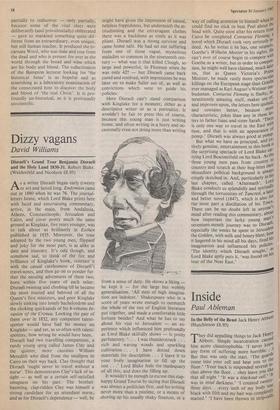Dizzy vagans
David Williams
Disraeli's Grand Tour Benjamin Disraeli and the Holy Land 1830-31. Robert Blake. (Weidenfeld and Nicolson £8.95) As a writer Disraeli began early (twenty or so) and lasted long. Endymion came out in 1880 when he was 76. The journal- letters home, which Lord Blake prints here with lucid and entertaining commentary, arrive, in the main, from Andalusia, Athens, Constantinople, Jerusalem and Cairo, and cover pretty much the same ground as Kinglake, five years younger, was to talk about so brilliantly in Eothen published in 1835. Moreover, the tone adopted by the two young men, flippant and joky for the most part, is as alike as date and itinerary. It's odd though, and somehow sad, to think of the fire and brilliance of Kinglake's book, contrast it with the casual carelessness of Disraeli's travel-notes, and then go on to ponder fur- ther the ensuing adventures of these two, born within five years of each other: Disraeli twisting and climbing till he became the most trusted and beloved of all the Queen's first ministers, and poor Kinglake slowly sinking into lonely bachelordom and the choking quicksands of his 8-volume In- vasion of the Crimea. Looking the pair of them over in 1832, any competent talent- spotter would have had his money on Kinglake — and yet, as so often with talent- spotters, how wrong he would have been. Disraeli had two travelling companions, a randy young sprig called James Clay and the quieter, more cautious William Meredith who died from the smallpox in Cairo on their way back. Clay thought that Disraeli 'ought never to travel without a nurse'. This demonstrates Clay's lack of in- sight — as well as a certain self-satisfied smugness on his part. The brothel- haunting, clap-ridden Clay was himself a strong candidate for an attendant nurse, and as for Disraeli's dependence — well, he
might have given the impression of casual, helpless foppishness, but underneath the at- titudinising and the extravagant clothes there was a backbone as steely as it was pliant. Disraeli was a strong survivor and came home safe. He had set out suffering from one of those vague, mysterious maladies so common in the nineteenth cen- tury — what was it that killed Clough, so large and powerful, in Florence when he was only 42? — but Disraeli came back cured and resolved, with impressions he was later on to make fuller use of, as well as convictions which were to guide his policies.
Here Disraeli can't stand comparison with Kinglake for a moment, either as a descriptive writer or as a portraitist. It wouldn't be fair to press this of course, because this young man is just writing home, and often writing in a hurry and oc- casionally even not doing more than writing from a sense of duty. He shows a liking he kept it — for the large but wobbly generalisation. 'All men of high imagina- tion are indolent.' Shakespeare who in a score of years wrote enough to outmatch the whole of the rest of English literature put together, and made a comfortable little fortune besides? And what he has to say about his visit to Jerusalem — an ex- perience which influenced him profoundly as Lord Blake skilfully shows — is pretty perfunctory. `. • , I was thunderstruck . . rich and waving woods and sparkling cultivation . . . .1 have dotted down materials for description . I leave it to your lively imagination to fill up the rest . . Lord Blake feels the inadequacy of all this, and does the filling up.
It wouldn't be enough to excuse this slap- happy Grand Tourist by saying that Disraeli was always a politician first, and his writing never more than a pastime, or a means of shoring up his usually shaky finances, or a
way of calling attention to himself when he could find no stick to beat Peel about the head with. Quite soon after his return from Cairo he completed Contarini Fleming, a novel which Disraeli took very seriously deed. As he writes it he has, one suspects, Goethe's Wilhelm Meister in his sights. Ile can't ever of course begin to compete With Goethe as a writer, but in order to comPe°‘ sate, he might well have claimed, much later on, that as Queen Victoria's Prilti,_,e Minister, he made vastly more spectacular killings on the European stage than Goethe ever managed as Karl August's Weimar 00 budsman. Contarini Fleming is flashy, in; termittently amusing stuff, makes use oh and improves upon, the letters here quoted, and contains better, because more characteristic, jokes than any in these ler ters to father Isaac and sister Sarah. `There is only one way to travel in the East wit',, ease, and that is with an appearance 01 pomp.' Disraeli was always good at pomp' But what we have as principal, and ell- dray genuine, entertainment in this book is the surprising spectacle of Lord Blake ear- rying Lord Beaconsfield on his back. As the • three young men pass from country to country and scratch at their bug-bites their immediate political background is always crisply sketched in. And, particularly in his last chapter, called 'Aftermath', L°1 Blake conducts us splendidly and spiritedly through the tortuosities of Tancred, a late',. and better novel (1847), which is also for the most part a distillation of his ToWn; There can be no doubt left in anyone . mind after reading this commentary, aboT how important the larky young mall: seventeen-month journey was to Disraeli, especially the weeks he spent in Jerusalen) the Golden, with milk and honey blest; ho' 41 it lingered in his mind all his days, fired his imagination and influenced his policies. `The identity which Disraeli sought,' as Lord Blake aptly puts it, 'was found on his tour of the Near East.'


































 Previous page
Previous page